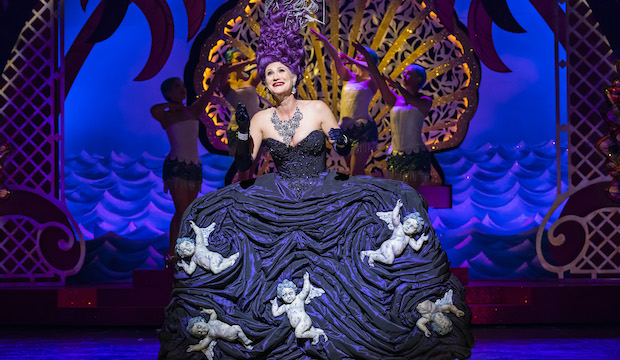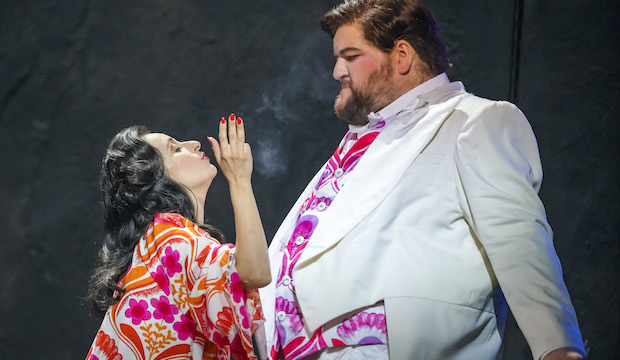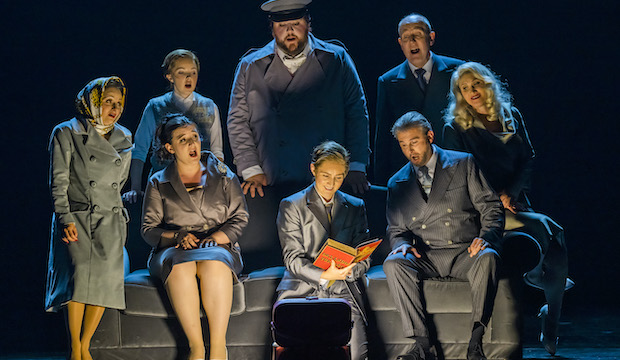Alcina, Glyndebourne Festival Opera review ★★★★★
Handel's opera of magic and transformation is staged with showbiz dazzle-dazzle
Soraya Mafi excels in Handel's Alcina. © Glyndebourne Productions Ltd. Photo: Tristram Kenton
On first night, the royal family was in the audience. There may have been politicians too. The first night in April 1735, that is, of Handel’s opera Alcina.
At the first night of Glyndebourne Festival Opera’s new production of Alcina, in July 2021, there were no visible royals, but a cluster of Tory has-beens, enjoying just the sort of extravaganza that Handel’s audience expected. It was spectacle that helped make the opera an immediate hit at the composer’s new theatrical home, the Theatre Royal, Covent Garden. The Royal Opera House stands on that site today.
Boasting all mod 18th-century cons, the Theatre Royal was just the place to stage an opera about magic, illusion and transformation. But how to captivate a more sceptical 21st-century audience? Director Francesco Micheli’s solution is to stay close to home, in the theatre world he inhabits, and as experienced in the 1960s in his native Italy, which revelled in shows that were unashamedly glamorous to the point of vulgarity.

Jane Archibald as Alcina in Francesco Micheli's glitzy production. © Glyndebourne Productions Ltd. Photo: Tristram Kenton
With a peacock-inspired design and dolce vita luxury, this Alcina isn’t embarrassed to entertain. Or, from to time, to baffle too. A little cloud of question marks hovered over the first-night audience as it entangled identities, and gender.
Alcina the sorceress is a diva-like starlet. Ruggiero, her new lover, is sung here by a woman, although the role was created for a male singer, the sought-after castrato Giovanni Carestini. But Micheli’s Ruggiero hints at sexual ambiguity, peeling back their shirt to reveal a sparkly bodice (which makes a late, and revelatory, reappearance).
Alcina’s practice is to turn enemies into animals or inanimate objects, which gives her a certain edge. Micheli’s theatrical metaphor doesn’t extend far: it’s directors like him who effect transformations not leading ladies. But no matter, this showbiz razzle dazzle is just what we need in dark days, and it all comes right in the end.
Canadian soprano Jane Archibald makes a memorable Glyndebourne debut, her extravagant voice and presence marking out Alcina as a superstar. Another new Glyndebourne face is American mezzo-soprano Samantha Hankey as unhappy Ruggiero. But the outstanding performance comes from soprano Soraya Mafi as Alcina’s sister Morgana.

Soraya Mafi as Morgana squares up to Stuart Jackson's Oronte. © Glyndebourne Productions Ltd. Photo: Tristram Kenton
Don’t you always love the ‘Best Supporting…’ category at awards time? ‘Supporting? Supporting?!’ you scream. ‘But they were the best thing in it!’ It’s like that with Alcina. The opera bears the sorceress’s name, but it is Morgana who steals hearts with her showstopping aria ‘Tornami a vagheggiar’, here performed as a song and dance number by fleet-footed Mafi and the often-present dancers.
Mafi became an instant Culture Whisper favourite in 2018 as Tytania in English National Opera’s production of Benjamin Britten’s A Midsummer Night’s Dream, and never fails to entertain with her stage presence and glistening musicality. Lovers of Glyndebourne’s earlier Handel hit, Giulio Cesare, and of Mark Morris’s danced ‘L’Allegro, il Penseroso ed Il Moderato’ know all about Handel’s irresistible rhythms, but it takes a special talent to bring off a demanding and much-loved aria and some smooth moves at the same time.
Much fun is had with the contrast between diminutive Mafi and towering tenor Stuart Jackson, sweet-voiced as her long-suffering lover Oronte.

Reconciliations time in Handel's Alcina. © Glyndebourne Productions Ltd. Photo: Tristram Kenton
There is more than a hint of Follies all round in this many-layered, showbiz-inspired evening, with its on-stage antics and backstage misunderstandings and sorrows.
Nothing but joy in the pit, however, where the Orchestra of the Age of Enlightenment is on customarily sparkling form, the cello line particularly lovely in Alcina’s plaintive aria ‘Credete al mio dolore’.
Bruno Poet’s deliciously strident lighting and shadow play enhance the eye-popping colours of Edoardo Sanchi’s set and Alessio Rosati’s flamboyant costumes.
There is special satisfaction in watching a self-regarding egomaniac who abuses their power brought down. And those who love the delicate tipping point where musical theatre and opera meet seamlessly, as I do, will love this production.
Alcina is sung in Italian with English surtitles. Further performances are on 5, 8, 14, 17, 24, 27, 30 July; 2, 4, 9, 15, 19, 24 Aug. Trains from Victoria are met by a bookable transfer bus, which also returns audiences to the station for the train home.
At the first night of Glyndebourne Festival Opera’s new production of Alcina, in July 2021, there were no visible royals, but a cluster of Tory has-beens, enjoying just the sort of extravaganza that Handel’s audience expected. It was spectacle that helped make the opera an immediate hit at the composer’s new theatrical home, the Theatre Royal, Covent Garden. The Royal Opera House stands on that site today.
Boasting all mod 18th-century cons, the Theatre Royal was just the place to stage an opera about magic, illusion and transformation. But how to captivate a more sceptical 21st-century audience? Director Francesco Micheli’s solution is to stay close to home, in the theatre world he inhabits, and as experienced in the 1960s in his native Italy, which revelled in shows that were unashamedly glamorous to the point of vulgarity.

Jane Archibald as Alcina in Francesco Micheli's glitzy production. © Glyndebourne Productions Ltd. Photo: Tristram Kenton
With a peacock-inspired design and dolce vita luxury, this Alcina isn’t embarrassed to entertain. Or, from to time, to baffle too. A little cloud of question marks hovered over the first-night audience as it entangled identities, and gender.
Alcina the sorceress is a diva-like starlet. Ruggiero, her new lover, is sung here by a woman, although the role was created for a male singer, the sought-after castrato Giovanni Carestini. But Micheli’s Ruggiero hints at sexual ambiguity, peeling back their shirt to reveal a sparkly bodice (which makes a late, and revelatory, reappearance).
Alcina’s practice is to turn enemies into animals or inanimate objects, which gives her a certain edge. Micheli’s theatrical metaphor doesn’t extend far: it’s directors like him who effect transformations not leading ladies. But no matter, this showbiz razzle dazzle is just what we need in dark days, and it all comes right in the end.
Canadian soprano Jane Archibald makes a memorable Glyndebourne debut, her extravagant voice and presence marking out Alcina as a superstar. Another new Glyndebourne face is American mezzo-soprano Samantha Hankey as unhappy Ruggiero. But the outstanding performance comes from soprano Soraya Mafi as Alcina’s sister Morgana.

Soraya Mafi as Morgana squares up to Stuart Jackson's Oronte. © Glyndebourne Productions Ltd. Photo: Tristram Kenton
Don’t you always love the ‘Best Supporting…’ category at awards time? ‘Supporting? Supporting?!’ you scream. ‘But they were the best thing in it!’ It’s like that with Alcina. The opera bears the sorceress’s name, but it is Morgana who steals hearts with her showstopping aria ‘Tornami a vagheggiar’, here performed as a song and dance number by fleet-footed Mafi and the often-present dancers.
Mafi became an instant Culture Whisper favourite in 2018 as Tytania in English National Opera’s production of Benjamin Britten’s A Midsummer Night’s Dream, and never fails to entertain with her stage presence and glistening musicality. Lovers of Glyndebourne’s earlier Handel hit, Giulio Cesare, and of Mark Morris’s danced ‘L’Allegro, il Penseroso ed Il Moderato’ know all about Handel’s irresistible rhythms, but it takes a special talent to bring off a demanding and much-loved aria and some smooth moves at the same time.
Much fun is had with the contrast between diminutive Mafi and towering tenor Stuart Jackson, sweet-voiced as her long-suffering lover Oronte.

Reconciliations time in Handel's Alcina. © Glyndebourne Productions Ltd. Photo: Tristram Kenton
There is more than a hint of Follies all round in this many-layered, showbiz-inspired evening, with its on-stage antics and backstage misunderstandings and sorrows.
Nothing but joy in the pit, however, where the Orchestra of the Age of Enlightenment is on customarily sparkling form, the cello line particularly lovely in Alcina’s plaintive aria ‘Credete al mio dolore’.
Bruno Poet’s deliciously strident lighting and shadow play enhance the eye-popping colours of Edoardo Sanchi’s set and Alessio Rosati’s flamboyant costumes.
There is special satisfaction in watching a self-regarding egomaniac who abuses their power brought down. And those who love the delicate tipping point where musical theatre and opera meet seamlessly, as I do, will love this production.
Alcina is sung in Italian with English surtitles. Further performances are on 5, 8, 14, 17, 24, 27, 30 July; 2, 4, 9, 15, 19, 24 Aug. Trains from Victoria are met by a bookable transfer bus, which also returns audiences to the station for the train home.
TRY CULTURE WHISPER
Receive free tickets & insider tips to unlock the best of London — direct to your inbox
| What | Alcina, Glyndebourne Festival Opera review |
| Where | Glyndebourne, Lewes, East Sussex, BN8 5UU | MAP |
| Nearest tube | Victoria (underground) |
| When |
02 Jul 22 – 24 Aug 22, 14 performances, times vary. Running time 5hr, including 1hr 30min dinner interval |
| Price | £15-£270 |
| Website | Click here for more information and booking |